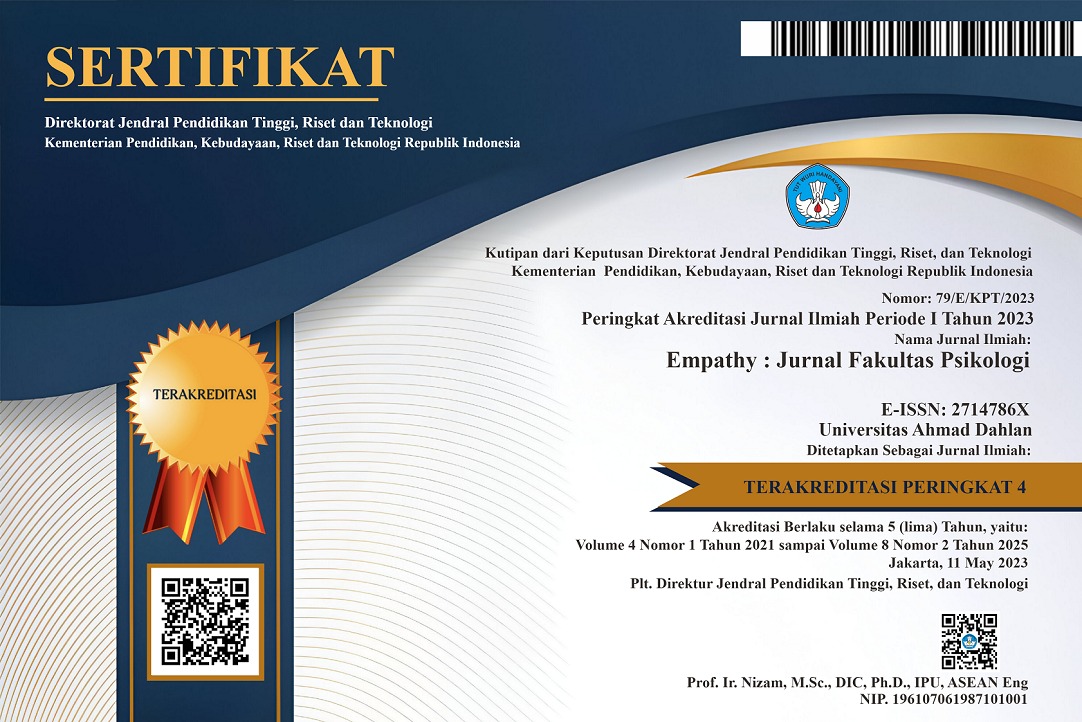Pola Asuh Demokratis dan Keterampilan Interpersonal Pada Fase Pertengahan Perkembangan Anak
DOI:
https://doi.org/10.12928/empathy.v5i1.23869Keywords:
Democratic parenting style, Interpersonal skillsAbstract
Democratic Parenting style and Interpersonal Skills In the Middle Phase of Child Development.
This study aims to determine the effect of democratic parenting on children's interpersonal skills. Quantitative research methods used in this study, research instruments in the form of a scale, democratic parenting scale and interpersonal skills scale. Determination of the research sample using purposive random sampling technique with the final number of subjects 59 children aged 9-11 years. The results obtained R2=0.350 and a correlation coefficient of 0.000 (p <0.050) meaning that this research hypothesis is accepted, democratic parenting has a positive influence on interpersonal skills, the effective contribution of democratic parenting contributes 45.3% to children's interpersonal skills. The conclusion of this study has a positive influence between democratic parenting of parents on children's interpersonal skills. The subject's perception of democratic parenting is in the high category and the subject's interpersonal skills are in the medium category.
References
Asri, I.G.A.A.S. (2018). Hubungan Pola Asuh Terhadap Perkembangan Anak Usia Dini. Jurnal Ilmiah Sekolah Dasar, 2(1), 1-9.
Azwar, S. (2012). Penyusunan Skala Psikologi. Pustaka pelajar.
Baumrind, D. (1991). The Influence of Parenting Style on Adolescent Competence and Substance Use. The Journal of Early Adolescence, 11(1), 56-95.
Bolghan-Abadi, M., Kimiaee, S. A., & Amir, F. (2011). The Relationship Between Parents' Child Rearing Styles and Their Children's Quality of Life and Mental Health. Psychology, 2(3), 229.
Cheung, C. K., Yue, X. D., & Wong, D. S. W. (2015). Addictive Internet Use and Parenting Patterns Among Secondary School Students in Guangzhou and Hong Kong. Journal of Child and Family Studies, 24(8), 2301-2309.
Fakhriyah, F., & Pratiwi, I. A. (2021). Pengaruh Pola Asuh Demokratis Terhadap Kemampuan Komunikasi Interpersonal Anak Usia 10-12 Tahun. Jurnal Basicedu, 5(4), 2513-2520.
Fatmawati, A., Pudyaningtyas, A. R., & Zuhro, N. S. (2021). Hubungan Pola Asuh Orang Tua Demokratis dengan Keterampilan Sosial Anak Usia 5-6 Tahun. Kumara Cendekia, 9(4), 218-224.
Hosokawa, R., & Katsura, T. (2017). Marital Relationship, Parenting Practices, and Social Skills Development in Preschool Children. Child and Adolescent Psychiatry and Mental Health, 11(1), 1-8.
Inikah, S. (2015). Pengaruh Pola Asuh Orang Tua Dan Kecemasan Komunikasi Terhadap Kepribadian Peserta Didik. Jurnal Bimbingan Konseling Islam, 6(1), 19-40.
Juniarti, F., Jumiatin, D., & Ariyanto, A. A. (2019). Mengembangkan Kecerdasan Interpersonal Melalui Metode Bermain Peran Pada Anak Usia Dini Di Ra Al Hidayah Bandung. CERIA (Cerdas Energik Responsif Inovatif Adaptif), 1(5), 1-6.
Khairani, K., & Septania, S. (2020). Pengaruh Pola Asuh Permisif Terhadap Interaksi Sosial Yang Dimoderasi Oleh Self-Disclosure Pada Generasi Z. Al-Qalb: Jurnal Psikologi Islam, 11(1), 1-7.
Kurniawati, F. (2017). Komunikasi Interpersonal Guru BK dengan Siswa Berperilaku Menyimpang (Studi Kasus di MTs N Boyolali 2016) (Doctoral Dissertation, Universitas Muhammadiyah Surakarta).
Laksmi, I. G. A. P. S., Aristiani, K. W., & Sudarsana, I. D. A. K. (2019). Hubungan Pola Asuh Orang Tua Dengan Komunikasi Interpersonal Pada Anak Autis Di Pusat Layanan Autis Kota Denpasar. Promotif: Jurnal Kesehatan Masyarakat, 9(2), 205- 211.
Larzelere, R. E., Morris, A. S. E., & Harrist, A. W. (2013). Authoritative Parenting: Synthesizing Nurturance and Discipline for Optimal Child Development. American Psychological Association.
Laxmi, A. V., & Kadapatti, M. (2012). Analysis of Parenting Styles and Interpersonal Relationship Among Adolescents. International Journal of Scientific and Research Publications, 2(8), 1-5.
Munifah, M., Elan, E., Rahman, T., & Gandana, G. (2019). Analisis Keterampilan Intrapersonal Anak Usia 5-6 Tahun Di TK Negeri Pembina Kota Tasikmalaya. Jurnal Pendidikan dan Konseling, 1(1), 78-83.
Newman & Newman. (2012). Life-Span Development A Psychosocial Approach 11th Edition. Canada : Wadsworth, Cengage Learning.
Ngewa, H. M. (2021). Peran Orang Tua dalam Pengasuhan Anak. YAA BUNAYYA, 1(1), 96-115.
Pellerin, L. A. (2005). Applying Baumrind's Parenting Typology to High Schools: Toward a Middle-Range Theory of Authoritative Socialization. Social Science Research, 34(2), 283-303.
Prayitno, N. (2007). Hubungan Antara Kematangan Beragama Islam dan Pola Asuh Demokratis Dengan Kecerdasan Emosi Pada Remaja (Doctoral Dissertation, Universitas Gadjah Mada).
Rahmina, W., Nurtiani, A. T., & Amelia, L. (2020). Analisis Kegiatan-Kegiatan Peningkatan Kecerdasan Interpersonal Anak Kelompok A di TK Cut Meutia Banda Aceh. Jurnal Ilmiah Mahasiswa Pendidikan, 1(1).
Santrock, J. W. (2013). Life-span Development Fourteenth Edition.
Spitzberg, B. H., & Cupach, W. R. (2012). Handbook of Interpersonal Competence Research. Springer Science & Business Media.
Suryani, W. S., Noviana, E., & Alpusari, M. (2019). Pola Asuh Orangtua dalam Mengembangkan Keterampilan Sosial Anak (Studi Kasus Keluarga Sarifudin, Jl. Suka Karya Perumahan Karya Pesona Mandiri Blok S Rt 01 Rw 27 Panam Pekanbaru). Jurnal Tunjuk Ajar, 2(2), 162-176.
Yanuarsari, R., Muchtar, H. S., & Nurapriani, R. (2019). Pengaruh Pola Asuh Orang Tua Terhadap Perkembangan Kecerdasan Interpersonal Anak Usia Dini Di TK Mekar Arum Kota Bandung. Indonesian Journal of Adult and Community Education, 1(1), 40-47.
Yolanda, Y. (2021). Hubungan Pola Asuh Orang Tua dengan Komunikasi Interpersonal Siswa dalam Proses Pembelajaran di Sekolah Dasar Negeri 15 Ulu Gadut Kota Padang (Doctoral dissertation, Universitas Negeri Padang).
Downloads
Published
Issue
Section
License
Authors who publish with Empathy: Jurnal Fakultas Psikologi agree to the following terms:
- Authors retain copyright and grant the journal right of first publication with the work simultaneously licensed under a Creative Commons Attribution License (CC BY-SA 4.0) that allows others to share the work with an acknowledgment of the work's authorship and initial publication in this journal.
- Authors are able to enter into separate, additional contractual arrangements for the non-exclusive distribution of the journal's published version of the work (e.g., post it to an institutional repository or publish it in a book), with an acknowledgment of its initial publication in this journal.
- Authors are permitted and encouraged to post their work online (e.g., in institutional repositories or on their website) prior to and during the submission process, as it can lead to productive exchanges, as well as earlier and greater citation of published work.

This work is licensed under a Creative Commons Attribution-ShareAlike 4.0 International License.



